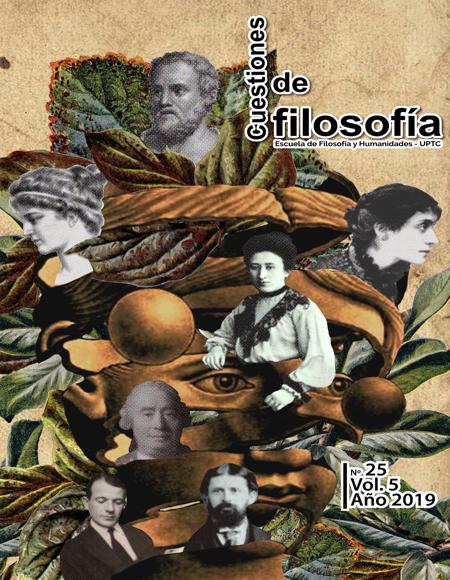Ethical-philosophical aspects of death: between moral responsibility and dehumanization

Abstract
In past times, the transgression of the norm that prohibits to murder another human being was supported in supernatural believes. In hostile times, the norm was removed to provide a room for the congenital sadism of human beings; however, there have been several scenarios and causes where death becomes protagonist. Following this direction, this work, in its first part, explores the freaky sense designated to death in archaic eras. Besides, a dialogue and a confrontation appear and spring from the possibility-impossibility and continuity-discontinuity concepts. In the second part, a contextualization of war and extermination as dynamical protagonists of cruelty. Dehumanization and the archaic inheritance of violence are highlighted as axis that gravitate around the body destruction of unnumbered subjectivities. In the third part, individual responsibility is analyzed before the abominable great Other. As a manner of end, we expose how to die by Other’s desire is legitimized by the state.
Keywords
muerte, guerra, responsabilidad, el otro, el gran otro
References
Arendt, H. (1998). El origen de los totalitarismos. (Trad. G. Solana). Madrid: Taurus.
Aristóteles. (1988). Política. (Trad. M. García Valdés). Madrid: Gredos.
Bataille, G. (2009). El erotismo. (Trad. A. Vicens y M. P. Sarazin). Barcelona: Tusquets.
Cuervo, B. (2017). Los campos de concentración Nazi. Historia Digital, 17(30), pp. 186-230.
De la Brière, Y. (1944) El derecho de la guerra justa: tradición teológica y adaptaciones contemporáneas. (Trad. L. Islas García). México: Jus.
Derrida, J. (2000). Dar la muerte. (Trad. C. de Peretti y P. Vidarte). Barcelona: Paidós.
Fanon, F. (1983). Los condenados de la tierra. (Trad. J. Campos). México: FCE.
Finley, M. (1978). El mundo de Odiseo. (Trad. M. Hernández Barroso). Barcelona: Tusquets.
Freud, S. (1980). Tótem y Tabú. (Trad. J. L. Etcheverry). Buenos Aires: Amorrortu.
Fromm, E. (1985). El miedo a la libertad. (Trad. G. Germani). Barcelona: Planeta-Agostini.
Foucault, M. (2002). Vigilar y castigar. (Trad. A. Garzón del Camino). Buenos Aires: Siglo XXI.
Grupo de Memoria Histórica. (2009). La masacre de El Salado: esa guerra no era nuestra. Colombia: Ediciones Semana y Editorial Taurus.
Habermas, J. (1990). Moral Consciousness and Communicative Action. (Trad. Ch. Lenhard y Sh. Weber Nicholsen). Cambridge: The MIT Press.
Heidegger, M. (2005). El ser y el tiempo. (Trad. J. Rivera). Santiago de Chile: Editorial Universitaria.
Horkheimer, M., y Adorno, T. (1994). Dialéctica de la ilustración. (Trad. J. J. Sánchez). Madrid: Trotta.
Horkheimer, M. (2002). Crítica de la razón instrumental. (Trad. J. Muñoz). Madrid: Trotta.
Kierkegaard, S. (1958). Temor y temblor. (Trad. J. Gringberg). Buenos Aires: Losada.
Levinas, E. (2001). De Dios que viene a la idea. (Trad. G. González, R. Arnáiz y J. M. Ayuso). Madrid: Caparros.
Levinas, E. (2002). Totalidad e infinito. (Trad. M. García-Baró). Salamanca: Sígueme.
Lledó, E. (2003). El epicureísmo. Madrid: Taurus.
Nietzsche, F. (2000). Voluntad de poder. (Trad. A. Froufe). Madrid: Edaf.
Nietzsche, F. (2004). Cómo se filosofa a martillazos. (Trad. L. Rutiaga). México: Tomo.
Quiceno, N., y Orjuela, C. (2017). Bojayá: memoria y horizontes de paz. Revista Colombiana de Sociología, 40(1), pp. 103-127.
Rosenzweig, F. (1997). La estrella de la redención. (Trad. M. Garcia-Baro). Salamanca: Sígueme.
Schopenhauer, A. (2002). Temor y temblor. (Trad. J. Gringberg). Buenos Aires: Losada.
Suárez, A. (2008). La sevicia en las masacres de la guerra colombiana. Análisis Político, 21(63), pp. 59-77.